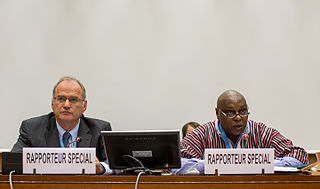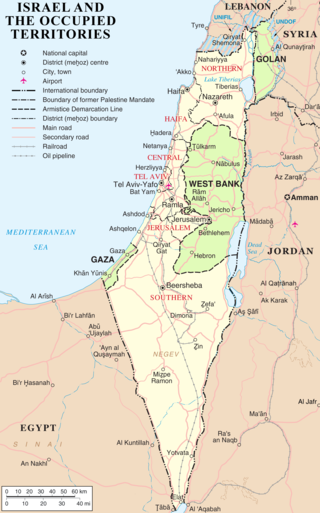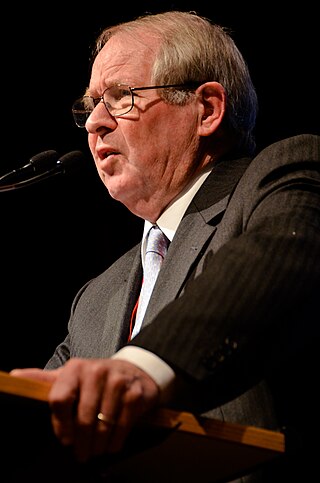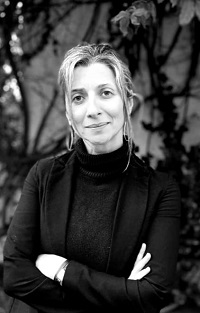
The Office of the United Nations High Commissioner for Human Rights, commonly known as the Office of the High Commissioner for Human Rights (OHCHR) or the United Nations Human Rights Office, is a department of the Secretariat of the United Nations that works to promote and protect human rights that are guaranteed under international law and stipulated in the Universal Declaration of Human Rights of 1948. The office was established by the United Nations General Assembly on 20 December 1993 in the wake of the 1993 World Conference on Human Rights.
Issues relating to the State of Israel and aspects of the Arab–Israeli conflict and more recently the Iran–Israel conflict occupy repeated annual debate times, resolutions and resources at the United Nations. Since its founding in 1948, the United Nations Security Council, has adopted 79 resolutions directly related to the Arab–Israeli conflict as of January 2010.

The United Nations Human Rights Council (UNHRC) is a United Nations body whose mission is to promote and protect human rights around the world. The Council has 47 members elected for staggered three-year terms on a regional group basis. The headquarters of the Council are at the United Nations Office at Geneva in Switzerland.

Special rapporteur is the title given to independent human rights experts whose expertise is called upon by the United Nations to report or advise on human rights from a thematic or country-specific perspective.

Israel has occupied the Palestinian territories and the Golan Heights since the Six-Day War of 1967. It previously occupied the Sinai Peninsula and southern Lebanon as well. Prior to Israel's victory in the Six-Day War, occupation of the Palestinian territories was split between Egypt and Jordan, with the former having occupied the Gaza Strip and the latter having annexed the West Bank; the Sinai Peninsula and the Golan Heights were under the sovereignty of Egypt and Syria, respectively. The first conjoined usage of the terms "occupied" and "territories" with regard to Israel was in United Nations Security Council Resolution 242, which was drafted in the aftermath of the Six-Day War and called for: "the establishment of a just and lasting peace in the Middle East" to be achieved by "the application of both the following principles: ... Withdrawal of Israeli armed forces from territories occupied in the recent conflict ... Termination of all claims or states of belligerency and respect for and acknowledgment of the sovereignty, territorial integrity and political independence of every State in the area and their right to live in peace within secure and recognized boundaries free from threats or acts of force."

Israel's policies and actions in its ongoing occupation and administration of the Palestinian territories have drawn accusations that it is committing the crime of apartheid. Leading Palestinian, Israeli and international human rights groups have said that the totality and severity of the human rights violations against the Palestinian population in the occupied territories, and by some in Israel proper, amount to the crime against humanity of apartheid. Israel and some of its Western allies have rejected the accusation, with the former often labeling the charge antisemitic.

Christopher John Robert Dugard is a South African professor of international law. His main academic specializations are in Roman-Dutch law, public international law, jurisprudence, human rights, criminal procedure and international criminal law. He has served on the International Law Commission, the primary UN institution for the development of international law, and has been active in reporting on human-rights violations by Israel in the Palestinian territories.
Issues relating to the State of Palestine and aspects of the Israeli–Palestinian conflict occupy continuous debates, resolutions, and resources at the United Nations. Since its founding in 1948, the United Nations Security Council, as of January 2010, has adopted 79 resolutions directly related to the Arab–Israeli conflict.

Richard Anderson Falk is an American professor emeritus of international law at Princeton University, and Euro-Mediterranean Human Rights Monitor's Chairman of the Board of Trustees. In 2004, he was listed as the author or coauthor of 20 books and the editor or coeditor of another 20 volumes. Falk has published extensively with multiple books written about international law and the United Nations.

Doru Romulus Costea is best known as President of the United Nations Human Rights Council. Costea served as president from 19 June 2007 to 18 June 2008. His main task was to initiate the Universal Periodic Review of the human rights records of the then 192 member states of the United Nations.
The United Nations Special Rapporteur on the situation of human rights in the Islamic Republic of Iran is a United Nations Special Rapporteur whose mandate is to monitor and investigate human rights violations in Iran. The current Special Rapporteur is Javaid Rehman. He is the sixth special rapporteur to Iran, following the tenures of Andrés Aguilar (1984–1986), Reynaldo Galindo Pohl (1986–1995), Maurice Copithorne (1995–2002), Ahmed Shaheed (2011–2016), and Asma Jilani Jahangir (2016–2018).

Miloon Kothari is a scholar and activist who served from 2000 to 2008 as the United Nations Special Rapporteur on adequate housing with the Human Rights Council. From 2015 to 2022, he was the President of UPR Info. He was convener of the Working Group on Human Rights in India and the UN (WGHR) from 2009 to 2014, an Indian human rights coalition that notably focuses on the Universal Periodic Review. He is the founder of the Delhi-based Housing and Land Rights Network (HLRN), which aims to work toward the "realization of the human rights to adequate housing and land." He currently serves as a member of the UN Commission of Inquiry on the Occupied Palestinian Territory, including East Jerusalem, and Israel.
Euro-Mediterranean Human Rights Monitor is an independent, nonprofit organization for the protection of human rights. Its main objective is to raise awareness about human rights law in Europe and the Mediterranean-North Africa area and to influence the international community to take action against human rights violators.
Tomás Ojea Quintana is an Argentine human rights lawyer who has served as United Nations Special Rapporteur on the situation of human rights in Myanmar and in North Korea.
Stanley Michael Lynk is a Canadian legal academic. He is currently an associate professor at the University of Western Ontario. From 2016 to 2022 he was the Special Rapporteur on the situation of human rights in the Palestinian Territories occupied since 1967.
The legality of the Israeli occupation of Palestine, which has continued since 1967 and is the longest military occupation in modern history, is a subject that has received much less attention than violations of international humanitarian law (IHL) and international human rights law (IHRL) that have occurred during the occupation. Multiple United Nations General Assembly resolutions have described the continuing occupation as illegal. The general thrust of international law scholarship addressing this question has concluded that, regardless of whether it was initially legal, the occupation has become illegal over time. Reasons cited for its illegality include use of force for impermissible purposes such as annexation, violation of the Palestinian right to self-determination, that the occupation itself is an illegal regime "of alien subjugation, domination and exploitation", or some combination of these factors. Eyal Benvenisti suggested that refusal by an occupier to engage in good faith with efforts to reach a peaceful solution should not only be considered illegal but as outright annexation. International law scholar Ralph Wilde states that "The common way of understanding the extended duration of the occupation... is a prolonged violation of international law". However, Israel denies that it is occupying Palestine and maintains that its presence is legal.

Francesca P. Albanese is an Italian international lawyer and academic. On 1 May 2022, she was appointed United Nations Special Rapporteur on the occupied Palestinian territories for a three-year term. She is the first woman to hold the position.
Makarim Wibisono is an Indonesian diplomat and the former Special Rapporteur on the situation of human rights in the Palestinian territories.















